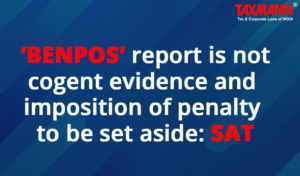‘BENPOS’ report is not cogent evidence and imposition of penalty to be set aside: SAT
- Blog|News|Company Law|
- 2 Min Read
- By Taxmann
- |
- Last Updated on 5 May, 2022

Case Details: Kundan Lal v. Securities and Exchange Board of India. - [2022] 137 taxmann.com 350 (SAT-Mumbai)
Judiciary and Counsel Details
-
- Justice Tarun Agarwala, Presiding Officer and M.T. Joshi, Judicial Member
- Ms. Kunjal Patil, Adv. for the Appellant.
- Pradeep Sancheti, Sr. Adv., Suraj Chaudhry, Ms. Nidhi Singh, Ms. Deepti Mohan, Ms. Binjal Samani, Ms. Aditi Palnitkar and Ms. Moksha Kothari, Advs. for the Respondent.
Facts of the Case
In the instant case, the Appellant was a compliance officer in ‘Sonata Software Limited’ (SSL). One of the employees of company sold some shares of company valuing more than Rs. 10 lakhs on 4-9-2018, without availing pre-trading approval and further did not intimate about transaction within two working days as stipulated under PIT Regulations. The said transaction was eventually disclosed to stock exchanges on 24-10-2018.
Since there was a delay, a penalty was imposed on the appellant for violation of regulation 9(1) and 9(3) of PIT Regulations. The appellant contended that there was no violation as he came to know of aforesaid transaction only on 22-10-2018 when he was doing verification of shareholding pattern for quarter ended 30-9-2018 and found that one employee of company had made certain transactions.
Further, it was contended that he made an enquiry from employee on 22-10-2018 and directed him to submit Form C which he did on 23-10-2018 and necessary disclosure under regulation 9(1) and 9(3) of PIT Regulations was made on 24-10-2018.
The Adjudicating Officer, after considering material evidence on record found appellant to be guilty on the basis of a letter submitted by company indicating that company had come to know about transaction on 10-9-2018 from BENPOS report which was submitted by Registrar and Transfer Agent (RTA).
Based on this information, the Adjudicating Officer came to the conclusion that appellant being compliance officer was also aware of information about transaction on 10-9-2018
SAT Held
On appeal, the SAT observed that findings given by Adjudicating Officer that appellant came to know about transaction done by employee on the basis of BENPOS report on 10-9-2018 was not based on cogent evidence and consequently, a benefit of doubt had to be given to appellant. Therefore, the impugned order of AO was quashed.
List of Cases Referred to
-
- Avenue Supermarts Ltd. v. SEBI [IT Appell No. 298 of 2020, dated 17-1-2022] (para 7).
Disclaimer: The content/information published on the website is only for general information of the user and shall not be construed as legal advice. While the Taxmann has exercised reasonable efforts to ensure the veracity of information/content published, Taxmann shall be under no liability in any manner whatsoever for incorrect information, if any.

Taxmann Publications has a dedicated in-house Research & Editorial Team. This team consists of a team of Chartered Accountants, Company Secretaries, and Lawyers. This team works under the guidance and supervision of editor-in-chief Mr Rakesh Bhargava.
The Research and Editorial Team is responsible for developing reliable and accurate content for the readers. The team follows the six-sigma approach to achieve the benchmark of zero error in its publications and research platforms. The team ensures that the following publication guidelines are thoroughly followed while developing the content:
- The statutory material is obtained only from the authorized and reliable sources
- All the latest developments in the judicial and legislative fields are covered
- Prepare the analytical write-ups on current, controversial, and important issues to help the readers to understand the concept and its implications
- Every content published by Taxmann is complete, accurate and lucid
- All evidence-based statements are supported with proper reference to Section, Circular No., Notification No. or citations
- The golden rules of grammar, style and consistency are thoroughly followed
- Font and size that’s easy to read and remain consistent across all imprint and digital publications are applied



 CA | CS | CMA
CA | CS | CMA
